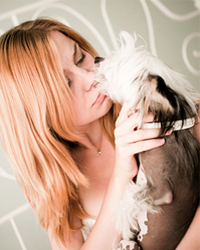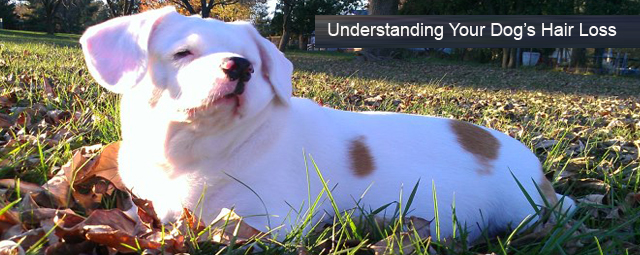Understanding Your Dog’s Hair Loss
Dogs are no exception when it comes to losing hair as time passes. Dogs and humans are alike when it comes to hair thinning and hair loss; it’s inconvenient, but not all dogs or humans experience it. When people lose hair or their hair thins, it’s usually linked to genetics. A dog’s coat thins for reasons that are easier to treat and control. If your dog is experiencing a loss or thinning of his or her coat, there are several things you can do as an owner to help your furry friend.
Fleas
Fleas are the most common explanation for your dog’s thinning coat and luckily the easiest of these problems to diagnose and treat. The quick treatment for getting rid of fleas is to invest in a doggie shampoo that is specifically designed to get rid of already existing fleas. Giving your dog a bath with this shampoo fixes the problem and gets rid of the fleas. As a precaution, you should be giving your dog flea medicine approximately once a month. The instructions are different depending on the brand and/or type you have, so follow the instructions precisely.
Allergies
If your dog has an allergy to something, it can result in severe hair loss. Like humans, dogs can be allergic to dust and pollen. If dust or pollen gets into your dog’s fur and he or she is allergic, the dog will compulsively scratch the fur in an attempt to feel relief. Contact your local veterinarian if you believe allergies are the problem for further assistance and treatment instructions.
Gland Issues
 When your dog’s hair loss doesn’t improve after taking action yourself, your dog may have some sort of thyroid or adrenal imbalance. Your dog’s hormones may be imbalanced; your local veterinarian can prescribe something to help balance your dog’s hormones. In less common and more severe cases, your dog may have a tumor of some sort. The sooner the tumor is diagnosed, the longer your pooch will live on average. Have your dog evaluated as soon as possible.
When your dog’s hair loss doesn’t improve after taking action yourself, your dog may have some sort of thyroid or adrenal imbalance. Your dog’s hormones may be imbalanced; your local veterinarian can prescribe something to help balance your dog’s hormones. In less common and more severe cases, your dog may have a tumor of some sort. The sooner the tumor is diagnosed, the longer your pooch will live on average. Have your dog evaluated as soon as possible.
Whatever the reason for your dog’s hair loss, the sooner you figure out what’s wrong the sooner your pooch can start feeling like his or her “old self” again. A healthy dog is a happy dog.






